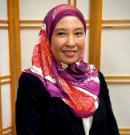Fulbright Scholar, education faculty member to present at UHV Discovers
A University of Houston-Victoria College of Education & Health Professions faculty member and a visiting Fulbright Scholar will present research from recent projects during UHV’s Homecoming Week festivities, including research on knowledge evaluators in education and internet connectivity in rural areas.
Sharon de Marin, an assistant professor of special education and a 2022 Junior Faculty Summer Research Grant recipient, and Wahidah Hashim, a visiting Fulbright Scholar and an associate professor from the National Energy Institute in Malaysia, will share research from their respective fields from 1:30-2:30 p.m. March 30 in Room 111 of UHV University North, 3007 N. Ben Wilson St. The presentation also will be livestreamed through Microsoft Teams. The event is free and open to the public and will be part of UHV’s 2023 homecoming celebration, called Rise of the Jaguars.
“It is important to share our findings from our research with our fellow faculty,” De Marin said. “We need their input and feedback to grow professionally.”
This is the ninth session of the UHV Discovers series, which highlights the research conducted by UHV faculty members and how their work impacts their fields of study and higher education. UHV graduate students also have been invited to present their research during previous sessions.
During De Marin’s presentation, attendees can expect to learn about the current state of knowledge evaluators across the U.S. and the methods they use to assess students who are suspected of having math disabilities and their knowledge on evidence-based interventions. De Marin will discuss her findings from her study titled “Examining the Perceptions of Knowledge on Math Disabilities, Assessments, and Interventions among Evaluators Across the United States.” Throughout the country, there are various titles evaluators in education use, such as diagnostician, educational psychologist, psychometrist and Licensed Specialist in School Psychology. De Marin will go over the preliminary results of this study, which were twofold: to provide university faculty insight into areas that need to be addressed, modified, improved and/or strengthened, and to increase graduate students’ level of preparedness going into the field.
Hashim will share her research that relates to the studies of a reliable internet communication network for sustainable community resilience and highlight the issues of internet connectivity in remote areas of Malaysia with true stories she has gathered so far from her fieldwork. Hashim also will share how local governments and organizations could help rural communities overcome the challenge of unreliable internet connectivity and how having reliable internet in rural areas is not only important for daily life but also crucial for economic and social development. Hashim, who has spent years studying internet connectivity in rural areas, will also speak about how providing internet in rural areas around the world is beneficial. She is open to speaking with attendees about the research process and how she has brought international attention to this issue.
“I am looking forward to sharing my work with the university and the community,” Hashim said. “I wish to have a long collaboration with UHV, and I welcome any collaboration that can help move this research forward.”
To watch the livestream of the event through Microsoft Teams on March 30, go to www.uhv.edu/uhv-discovers.
The University of Houston-Victoria, located in the heart of the Coastal Bend region since 1973 in Victoria, Texas, offers courses leading to more than 50 academic programs in the schools of Arts & Sciences; Business Administration; and Education, Health Professions & Human Development. UHV provides face-to-face classes at its Victoria campus, as well as an instructional site in Katy, Texas, and online classes that students can take from anywhere. UHV supports the American Association of State Colleges and Universities Opportunities for All initiative to increase awareness about state colleges and universities and the important role they have in providing a high-quality and accessible education to an increasingly diverse student population, as well as contributing to regional and state economic development.


